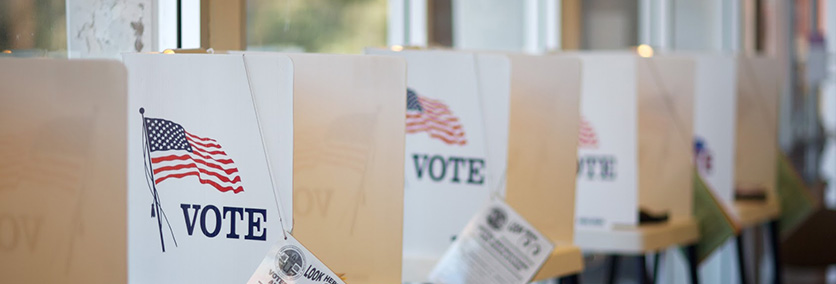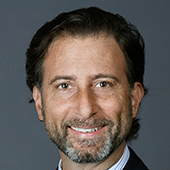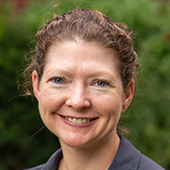Elections and Democracy

Overview
Featured Expert(s)
Tabitha Bonilla

IPR social policy expert Tabitha Bonilla studies political behavior, identity, and communication and broadly examines how the public understands politics and policy. Her research focuses on the effects of campaign rhetoric on voter perceptions of representation and voter mobilization.
Eli Finkel

IPR social psychologist Eli Finkel studies political psychology, with a focus on political sectarianism and antidemocratic tendencies in the U.S. He examines the intersection of interpersonal relationships and political speech and action.
Laurel Harbridge-Yong

IPR political scientist Laurel Harbridge-Yong explores how elections, institutions, and policy are connected in the United States. Her research investigates a range of questions surrounding partisan conflict and the difficulty of reaching bipartisan agreement and legislative compromises in American politics.
William Brady

IPR associate William Brady's research examines the dynamics of emotion at the social network level and their consequences for group behavior. His recent work studies how human psychology and AI-mediated social contexts interact to shape our emotions and intergroup attitudes.
Erik Nisbet

IPR associate Erik Nisbet's research lies at the intersection of media, public opinion, and public policy in the areas of science, technology, and environmental policy, democracy and elections, and international security.
Want more policy research?
Stay informed about trending policy research topics and more.
Get the latest IPR newsletter sent to your inbox.
Research Roundup
Legislators Prioritize Primary Voters Over General Election Voters
A study by IPR political scientist Laurel Harbridge-Yong finds that legislators have incentives to prioritize primary voters over general election voters. These incentives, a product of the American two-stage election process, can shape which constituents’ policy preferences are represented in Congress—and may also contribute to polarization.
Voters Hold Candidates to Their Promises During Campaigns
In her book The Importance of Campaign Promises (Cambridge University Press, 2022), IPR social policy expert Tabitha Bonilla shows that voters notice how committed candidates are to policy issues based on their language and hold candidates accountable for promises. Not only do voters understand the difference between a general policy stance and a specific promise to take action, but also that voters judge candidates more harshly if they do not follow through on their promises.
Presidential Candidates from the Same Party Use Moral Rhetoric in Similar Ways
Moral rhetoric—or emphasizing ideas of what is right and wrong—is a powerful persuasion technique for candidates running for election. Kellogg social psychologist and IPR associate William Brady reveals that presidential candidates from different political parties use moral rhetoric in similar ways. This allows candidates to either isolate themselves from the party, like Donald Trump in the 2016 election, or insulate themselves, like Joe Biden in the 2020 election.Why Are Online Political Discussions so Toxic?
Research by IPR social psychologist Eli Finkel shows that comments by politically engaged Reddit users are toxic even if they are not discussing politics, suggesting that people who choose to participate in political conversations are generally uncivil. This incivility can make people reluctant to engage in political discourse, leaving online spaces dominated by toxic individuals.Keep Reading
Read more insights from our faculty about the 2024 election.
- CBS News interviewed Tabitha Bonilla about how voter suppression remains a major issue this election cycle, continuing a troubling historical trend. “If you hear something that doesn’t seem to make sense, it is okay to reach out to your election officials and ask questions,” she told them.
- Erik Nisbet spoke to The Washington Post about the increase in threats and political violence and explained that we may be hitting a "new plateau" in public tolerance for violence.
- In an op-ed in the Chicago Sun Times, Laurel Harbridge-Yong and her colleagues write about how the Trump assassination attempt captured the "true human cost" of political violence, noting that both Democrats and Republicans were less likely to justify violence after the event.
- WBEZ discussed the longstanding history of Black women’s avid participation in American politics with Sally Nuamah. “For the first time in history, potentially, you’re seeing Black women across generations be in political leadership at the same time, which provides an opportunity for the kind of political change that we’ve never seen before,” she said.
- The Atlantic wrote about a study by Benjamin Jones looking at the effect of assassinations on institutions in the wake of the assassination attempt on Donald Trump and how the attempt may not decide the election. “Would-be assassins are chaos agents more than agents that direct the course of history,” he told the Atlantic.
Subscribe
Sign up for email updates on IPR research news and events.